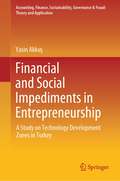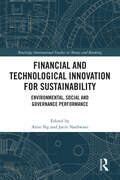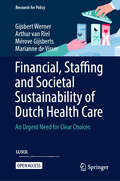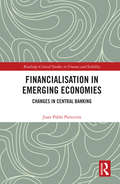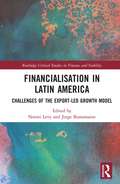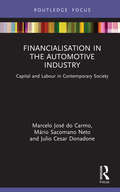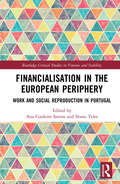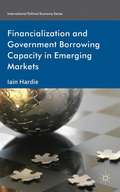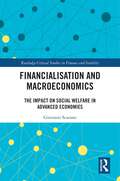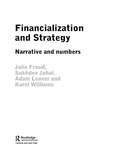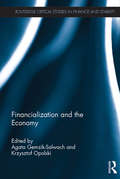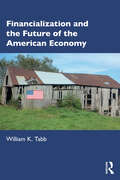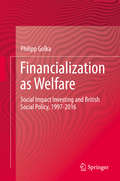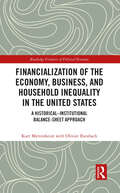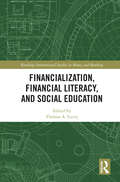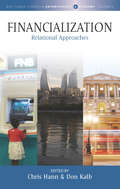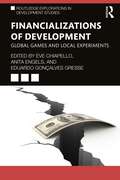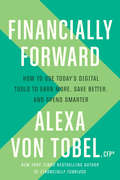- Table View
- List View
Financial and Managerial Accounting (Second Edition)
by Donald E. Kieso Jerry J. Weygandt Paul D. KimmelFinancial and Managerial Accounting, 2nd Edition provides students with a clear introduction to fundamental accounting concepts. The Second Edition helps students get the most out of their accounting course by making practice simple. Newly streamlined learning objectives help students use their study time efficiently by creating a clear connections between the reading and video content, and the practice, homework, and assessments questions. Weygandt, Financial and Managerial Accounting is ideal for a two-semester Financial and Managerial Accounting sequence where students spend equal time learning financial and managerial accounting concepts, and learn the accounting cycle from a corporate perspective. This program begins by introducing students to the building blocks of the accounting cycle and builds to financial statements. WileyPLUS sold separately from the text.
Financial and Managerial Accounting (Seventeenth Edition)
by Jan Williams Joseph Carcello Mark Bettner Susan HakaWith the seventeenth edition of Financial and Managerial Accounting: The Basis for Business Decisions, the Williams author team continues to be a solid foundation for students who are learning basic accounting concepts. Hallmarks of the text - including the solid Accounting Cycle Presentation, relevant pedagogy, and high quality, end-of-chapter material--have been updated throughout the book.
Financial and Managerial Accounting for MBAs
by Robert Halsey Peter Easton Mary Lea McAnallyFinancial and Managerial Accounting for MBAs Textbook
Financial and Managerial Accounting: Information for Decisions
by John J. Wild Ken W. ShawBuilding on the success of the best-selling Fundamental Accounting Principles text, authors John Wild, Kenneth Shaw, and Barbara Chiappetta created Financial and Managerial Accounting: Information for Decisions to provide a corporate perspective and balanced coverage in this growing course area. With its step-by-step approach, FinMan streamlines complex accounting processes and helps students build confidence by mastering key concepts and procedures. Chapter opening vignettes using dynamic entrepreneurs appeal to all students and show the relevance of accounting. Students are encouraged to think like a businessperson and apply what they learn. A wide variety of assignments provide instructors with materials to teach, assess, and challenge students on several levels. Join your colleagues and students that have used this best-selling learning system to advance their education and careers.
Financial and Social Impediments in Entrepreneurship: A Study on Technology Development Zones in Turkey (Accounting, Finance, Sustainability, Governance & Fraud: Theory and Application)
by Yasin AkkuşThis book uncovers the barriers that impede entrepreneurial innovation, delving into the profound impact of personality traits on success. It explores the psychological and sociological factors that hinder progress, providing valuable insights into the hidden challenges faced by entrepreneurs. As Small and Medium-Sized Enterprises (SMEs) thrive in global markets, sustainable development faces obstacles. This book reveals the overlooked psychological and sociological hurdles that entrepreneurs encounter, shedding light on their effects on innovation.Through extensive research, the authors illuminate the connection between personality traits and entrepreneurial success, particularly risk-taking propensity. They uncover the complex interplay between personal traits and the social environment, highlighting societal constructs that impede entrepreneurial potential.While research on entrepreneurial personalities has grown, understanding sociological impediments remains limited. This book bridges the gap, offering a comprehensive analysis of the multifaceted challenges entrepreneurs face. It equips readers with strategies to navigate complexities and foster innovation.This transformative book unveils the barriers hindering entrepreneurial innovation, unlocking the psychological and sociological obstacles. It is a must-read for aspiring entrepreneurs, professionals, researchers, and policymakers seeking to harness SME potential for a prosperous future.
Financial and Technological Innovation for Sustainability: Environmental, Social and Governance Performance (Routledge International Studies in Money and Banking)
by Artie Ng Jatin NathwaniThe COVID-19 crisis has proven that sustainability of an institution or organization requires a constant review of one’s strategic positioning and the execution of pertinent plans in response to evolving externalities. Resilient organizations continue to revive themselves through effective R&D and the renewal of their range of products and services. Financial and Technological Innovation for Sustainability: Environmental, Social and Governance Performance examines approaches to sustainability under the ongoing development of energy sustainability and the green finance initiatives. It unveils global heterogeneous efforts in achieving Environmental Social Governance (ESG) performance in light of climate change, global sustainability and concerns over corporate “greenwashing”. The book assembles a wealth of case studies from a variety of contemporary organizations that actively pursue sustainable development while seeking their next economic growth. These global cases demonstrate the salience of governance that institutes continuous advancements to enable the timely revitalization of corporate strategies, technological innovation and deployment of financial resources for sustainability transformation regardless of their stages of lifecycle. They reveal distinct approaches to financial and technological innovation in Africa, Asia, Europe and North America in pursuing the shared UN Sustainable Development Goals. The intertwined public-private partnership and implications of geopolitics under an evolving global financial system for sustainability transformation are articulated. This book will appeal to academics as well as business and finance professionals, who are keen to understand the interrelationship between financial and technological innovation, and to those who want to comprehend the underlying global challenges and opportunities of adopting emerging technologies to reinvent a business model that forges measurable and impactful ESG performances.
Financial, Staffing and Societal Sustainability of Dutch Health Care: An Urgent Need for Clear Choices (Research for Policy)
by Mérove Gijsberts Gijsbert Werner Arthur van Riel Marianne de VisserThis open access book analyzes how sound choices can be made in Dutch health care policies, and shows why they are necessary, urgent, and even inevitable. Analyzing the current functioning and funding of the Dutch health care system, this book shows how three dimensions of sustainability – financial, staffing and societal – are under increasing pressure. This study explores priority setting in health care and calls for well-informed, clear and sometimes uncompromising choices in the allocation of means and personnel. This is necessary in order to maintain accessible and high-quality care for all, and to improve public health. Making balanced choices in health care is of particular importance to vulnerable groups whose voices may not be heard as readily or effectively in the public debate, and whose interests are more easily crowded out. Prioritizing in the domain of public health care is first and foremost a political responsibility, but also one for health care providers across the system and ultimately also for citizens. While this work focuses on the Netherlands, similar processes are at play across the developed economies, making it broadly relevant to policy makers, health care professionals and health care (policy) researchers grappling with the questions surrounding the sustainability of public health care.
Financialisation in Emerging Economies: Changes in Central Banking (Routledge Critical Studies in Finance and Stability)
by Juan Pablo PainceiraSince the beginning of the 2000s, emerging market economies, or middle-income countries, have embarked on major changes in their domestic financial systems. These changes – in which central banks have been key players – are shaped by the process of financialisation, which can generally be characterised by the dominance of financial considerations in the conduct of major agents (banks, non-financial corporations and households). As a consequence of the emerging markets crisis at the end of the 1990s, a new phenomenon in global financial markets emerged: a massive accumulation of foreign reserves in emerging economies. This has had important consequences for the global economy in which developed economies are the major beneficiaries. Based on Marxist political economy, this book studies the trends towards financialisation in emerging economies, focusing on the effects of the reserve accumulation in their international and domestic spheres. It argues that reserve accumulation has been the very catalyst of financialisation, being related to the subordinated position of emerging economies in the international monetary system. The chapters explore how these trends were exacerbated by the 2008 global financial crisis as well as the extraordinary monetary measures undertaken by the major central banks to deal with the effects of this. Foreign investors invested an enormous amount into emerging economies between 2010 and 2012 and emerging-market financial assets have doubled since 2008. To conclude, the book discusses how the US monetary policy normalisation has added more complexity to these trends since 2013 by putting pressure on emerging markets related to the level of global liquidity. This book provides essential reading for students and scholars of finance, economics and political economy who are interested in the unfolding of the subordinated financial integration of emerging economies into global financial markets.
Financialisation in Latin America: Challenges of the Export-Led Growth Model (Routledge Critical Studies in Finance and Stability)
by Jorge Bustamante Noemi LevyFinancial capital continues to dominate Western economic organisations, despite major financial and economic crises. While these have not affected Latin American countries in the same way, other economic problems emerged after the reversion of loose monetary policies that debilitated the export-led growth model. This book discusses the issue of the financialised globalisation model in Latin America, looking at the region’s relationship with the international market. This edited collection is divided into three main sections. The first section discusses regional trends highlighting issues of trade and payments in financialised economies, the impact on deindustrialisation, its effect on inequality, external capital movements and monetary policies. The second section analyses the failure of comparative advantages of the export-led model in Colombia, Argentina and Mexico. Finally, the last section deals with the growth of financial balance sheets in small and developing economies such as Chile; how growth, investment and big corporation evolution were affected in Brazil and Mexico; and the effects of foreign exchange activity in Mexico. Through these discussions, this book aims to deepen the understanding of the crisis of financialisation and the export-led model, raising the question of whether it is possible for this model to continue or if it requires major readjustments to unfold economic growth. This book provides a distinctive analysis of the financialisation mechanisms in developing countries in order to emphasise affinities and differences between the countries of the region in productive and financial terms. It will be of great interest to economic and social science scholars and students, to journalists specialising on economic and development issues, and, more importantly, to policy makers.
Financialisation in the Automotive Industry: Capital and Labour in Contemporary Society (Routledge Frontiers of Political Economy)
by Marcelo José do Carmo Mário Sacomano Neto Julio Cesar DonadoneWhere presidents or members of affluent families were previously seen, it is increasingly the case that car manufacturers are owned by banks and investment funds which have taken control of the entire economic life of these firms. This has significant impact on the terms of employment and layoffs, wages and precarious work, growing inequalities in income strata, compensation levels for executives, and the implementation of short-termist strategies across business operations. This book explores this increasing financialization – the predominance of the financial sector over the productive sector – in the automotive industry. In particular it is shown that the financial operations of these companies through leasing, insurance, loans, and other financial instruments is now much more profitable than the manufacturing aspects of the business, which was originally the raison d’être for these firms. The chapters demonstrate how there are great demands to increase the return to shareholders as a main concern, despite other metrics and/or other stakeholders. The work studies the impact of financialization at the world’s five largest automakers which together represent almost 50% of car production, providing an exploratory analysis of profitability, shareholder composition, compensation to executives, workers' salaries, dividend payments to shareholders, and employment. Encouraging debate on contemporary economy, this book marks a significant addition to the literature on financialization, contemporary forms of capitalism, labour and economic sociology more broadly.
Financialisation in the European Periphery: Work and Social Reproduction in Portugal (Routledge Critical Studies in Finance and Stability)
by Ana Cordeiro SantosIn many European countries, the process of financialisation has been exacerbated by the project of closer EU integration and accelerated as a result of austerity policies introduced after the Euro crisis of 2010–2012. However, the impact has been felt differently in core and peripheral countries. This book examines the case of Portugal, and in particular the impact on its economy, work and social reproduction. The book examines the recent evolution of the Portuguese economy, of particular sectors and systems of social provision (including finance, housing and water), labour relations and income distribution. In doing so, it offers a comprehensive critical analysis of varied aspects of capital accumulation and social reproduction in the country, which are crucial to understand the effects of the official ‘bail-out’ of 2011 and associated austerity adjustment program. The book shows how these have increasingly relied on deteriorating pay and working conditions and households’ direct and indirect engagement with the global financial system in new domains of social reproduction. Through its exploration of the Portuguese case, the book presents a general theoretical and methodological framework for the analysis of financialisation processes in peripheral countries. This text is essential reading for students and scholars of political economy, development, geography, international relations and sociology with an interest in examining the uneven mechanisms and impacts of global finance.
Financialization and Government Borrowing Capacity in Emerging Markets
by Iain HardieHardie investigates the link between the financialization - defined as the ability to trade risk - and the capacity of emerging market governments to borrow from private markets. He considers the government bond markets in Brazil, Lebanon and Turkey and includes interviews with 126 financial market actors.
Financialization and Macroeconomics: The Impact on Social Welfare in Advanced Economies (Routledge Critical Studies in Finance and Stability)
by Giovanni ScaranoFinancialisation has become a widely discussed and debated term leading to a plurality of perspectives, but no fixed definition or single reading. This book presents a critical exploration and review of the current literature on financialisation, focusing on the financialisation of NFCs and its possible implications for the macroeconomic and financial stability of advanced countries. Starting from this critical analysis, it proposes some new readings of the process of financialisation, linking it directly, on the one hand, to the evolution of interest-bearing capital and the credit system, and, on the other hand, to the historical tendencies of monopoly capital towards financial arrangements to manage corporate control. Finally, a conceptual scheme for interpretation and a mathematical model of corporate portfolio choice is developed to explain how the tendency in developed countries to place growing shares of social surplus in speculative financial channels can contribute to their long-term real stagnation. The book also underlines the excessive attention usually being paid to some micro-epiphenomena that show a fallacy of composition at the macroeconomic level and can lead to some misunderstandings of the general trends in capitalist evolution. Moreover, some doubts are raised about the extent to which financialisation actually represents a change to the present regime of accumulation. The book targets all the scholars who are interested in better understanding whether financialisation constitutes a profound change in the functioning of capitalist economic systems and what effects it can produce in social welfare in the advanced countries.
Financialization and Strategy: Narrative and Numbers
by Julie Froud Sukhdev Johal Adam Leaver Karel WilliamsConsidering the recent impact of the capital market on corporate strategy, this text analyzes, through argument and supportive case studies, how pressures from the capital bull market of the 1990s and bear market of the early 2000s, have reshaped management action and calculation in large, publicly quoted US and UK corporations. Beginning with the dissatisfaction with classical strategy and its limited engagement with the processes of financialization, the book moves on to cover three detailed company case studies (General Electric, Ford and GlaxoSmithKline) which use long run financial data and analysis of company and industry narratives to illustrate and explore key themes. The book emphasizes the importance of company and industry narrative, while also analyzing long term financial results, and helps to explain the limits of management action and the burden of expectations placed on corporate governance. Presenting financial and market information on trajectory in an accessible way, this book provides a distinctive, critical social science account of management in large UK and US corporations, and it is a valuable resource for students, scholars and researchers of business, management, political economy and non-mainstream economics. short listed for the 2007 IPEG Book Prize
Financialization and the Economy (Routledge Critical Studies in Finance and Stability)
by Agata Gemzik-Salwach Krzysztof OpolskiThere can be no doubt that the influence of the financial sphere has intensified rapidly in recent years, but there is much debate about the effect of that influence. The aftermath of the Financial Crisis has led to numerous discussions of the phenomenon of so-called financialization: the increasing impact of financial institutions on the activity of all business entities; emerging threats related with dynamically developing financial markets and the growing importance of financial themes. In light of these issues, which appear in all economies and touch all entities and every area of economic activity, there is a need for a summary and evaluation of the role of financialization in the world today. This monograph presents the role of financialization in the modern world. It shows positive as well as negative effects of financialization on the stability of the whole economy, the functioning of different types of markets, activity of enterprises, state institutions and behaviours of households. Written by expert contributors, this book plays an important role in the debate concerning future directions of development of the financial sector and financial markets. Financialization and the Economy is of great importance to those who study political economy, macroeconomics and banking.
Financialization and the Future of the American Economy
by William K TabbFinancialization is a set of processes which has led to a financially driven and commodified economy with rising inequality, tax avoidance, and a lack of investment in the physical and social infrastructure. Given the influence of money politics, and the secular increase in the burden of debt, financialization has produced a deeply flawed economic system which mainstream economists are unable to address. This book discusses the causes and costs of financial crises, how financialization produces inequality and instability, and the patterns of value extraction it enables. It draws on key theoretical traditions, most prominently the writing of Marx, Keynes, and Minsky that illuminate much that is ignored and rejected in mainstream theorizing, including by many who identify as Keynesians. After decades of low interest rates and years of quantitative easing (QE), keeping borrowing costs near zero, many borrowers – households, businesses, banks, shadow banks, and governments – will not be able to finance their debt at the higher interest rates initiated by central banks to address inflation. The resulting stagflation will be global, producing a severe downturn that may be postponed through still greater debt creation but not avoided by conventional means. The book also explores the ways that standard financial criteria contribute to the climate emergency and the manner in which the commodification of nature proceeds from the desire to create new, marketable derivative products. It concludes with a discussion of what needs to be done to move away from a harmful regime of accumulation premised on financialization and to adopt a far better one. This book is essential reading for anyone interested in the causes and consequences of financialization and its impact on the economy.
Financialization as Welfare: Social Impact Investing And British Social Policy, 1997-2016
by Philipp GolkaProviding an in-depth case study on the emergence of social impact investing in the UK, this book develops a new perspective on financialization processes that highlights the roles of non-financial actors. In contrast to the common view that impact investing gears finance toward the solution of social problems, the author analyzes how these investments create new problems and inequalities. To explain how social impact investing became popular in British social policy despite its unclear effectiveness, the author focuses on cooperative relations between institutional entrepreneurs from finance and various non-financial actors. Drawing on field theory, he shows how seemingly unrelated social transformations – such as HM Treasury's expanding role in public service reform – may act as resonance spaces for the spread of finance. Opening up a new perspective on financialization processes in the terrain of public policy, this book invites readers to refocus scholarship on capitalist dynamics to the meso-level. Based on this analysis, the author also proposes ways to transform social impact investing to increase its potential for reducing global inequalities.
Financialization of the Economy, Business, and Household Inequality in the United States: A Historical–Institutional Balance-Sheet Approach (Routledge Frontiers of Political Economy)
by Kurt Mettenheim Olivier ButzbachThis second volume on the political and social economy of financialization in the US focuses on the consequences of the rise of finance for the American macroeconomy, household inequality, and the management of nonfinancial business enterprises. A historical–institutional balance-sheet approach to long-term trends and recent change in the US reveals a series of anomalies and provisos for critical, heterodox, and mainstream economic approaches and provides new perspectives on debates about political economic change in advanced economies since the 2007–2008 financial crisis. This book marks a significant contribution to the literature on financialization and studies in social economics, household economics, the structure and management of nonfinancial business enterprises, and American political economy.
Financialization, Financial Literacy, and Social Education (Routledge International Studies in Money and Banking)
by Thomas A. LuceyThe objective of this book is to prompt a re-examination of financial literacy, its social foundations, and its relationship to citizenship education. The collection includes topics that concern indigenous people’s perspectives, critical race theory, and transdisciplinary perspectives, which invite a dialogue about the ideologies that drive traditional and critical perspectives. This volume offers readers opportunities to learn about different views of financial literacy from a variety of sociological, historical and cultural perspectives. The reader may perceive financial literacy as representing a multifaceted concept best interpreted through a non-segregated lens. The volume includes chapters that describe groundings for revising standards, provide innovative teaching concepts, and offer unique sociological and historical perspectives. This book contains 13 chapters, with each one speaking to a distinctive topic that, taken as a whole, offers a well-rounded vision of financial literacy to benefit social education, its research, and teaching. Each chapter provides a response from an alternative view, and the reader can also access an eResource featuring the authors’ rejoinders. It therefore offers contrasting visions about the nature and purpose of financial education. These dissimilar perspectives offer an opportunity for examining different social ideologies that may guide approaches to financial literacy and citizenship, along with the philosophies and principles that shape them. The principles that teach and inform about financial literacy defines the premises for base personal and community responsibility. The work invites researchers and practitioners to reconsider financial literacy/financial education and its social foundations. The book will appeal to a range of students, academics and researchers across a number of disciplines, including economics, personal finance/personal economics, business ethics, citizenship, moral education, consumer education, and spiritual education.
Financialization: Relational Approaches (Max Planck Studies in Anthropology and Economy #6)
by Don Kalb Chris HannBeginning with an original historical vision of financialization in human history, this volume then continues with a rich set of contemporary ethnographic case studies from Europe, Asia and Africa. Authors explore the ways in which finance inserts itself into relationships of class and kinship, how it adapts to non-Western religious traditions, and how it reconfigures legal and ecological dimensions of social organization, and urban social relations in general. Central themes include the indebtedness of individuals and households, the impact of digital technologies, the struggle for housing, financial education, and political contestation.
Financializations of Development: Global Games and Local Experiments (Routledge Explorations in Development Studies)
by Ève Chiapello Anita Engels Eduardo Gonçalves GresseFinancializations of Development brings together cutting-edge perspectives on socio-political, socio-historical and institutional analyses of the evolving multiple and intertwined financialization processes of developmental institutions, programs and policies. In recent years, the development landscape has seen a radical transformation in the partaking actors, which have moved beyond just multilateral or bilateral public development banks and aid agencies. The issue of financing for sustainable development is now at the top of the agenda for multilateral development actors. Increasingly, development institutions aim to include private actors and to lever in private money to support development projects. Drawing on case studies conducted in Africa, Asia, Europe and Latin America, this book examines the ways in which these private finance actors are enrolled and associated with the conception and implementation of development policies. Beginning with a focus on global actors and private foundations, this book considers the ways in which development funding is raised, managed and distributed, as well as debates at the center of global forums where financialized policies and solutions for development are conceived or discussed. The book assembles empirical research on development programs and demonstrates the social consequences of the financializations of development to the people on the ground. Highlighting the plurality of processes and outcomes of modern-day relations, tools, actors and practices in financing development around the world, this book is key reading for advanced students, researchers and practitioners in all areas of finance, development and sustainability.
Financially Ever After: The Couples' Guide to Managing Money
by Jeff D. OpdykeYour Guide to Managing the Real Dollars—and the Real Emotions—of Your RelationshipToo often with money, couples face two choices: fight and risk making the situation worse, or keep quiet and risk making the situation worse. Financially Ever After offers a third option: family financial fluency—the insight, knowledge, and vocabulary every couple needs to communicate effectively about money.Jeff D. Opdyke, previously The Wall Street Journal's syndicated "Love & Money" columnist, covers any and all financial issues that couples face, including budgeting, deciding on whether to have joint or individual accounts, dividing up family financial chores, confronting debt, making major purchases, as well as handling mortgages, employment, children, and even engagement rings. He offers dozens of real-life scenarios between couples, with scripts and suggestions for how to broach delicate money-related subjects with your significant other, whether he or she has a shaky credit history or is feeling left out of family financial decision-making.The book also provides helpful tools to organize your financial life, such as a budgeting chart, a "scorecard" to track spending, and an "affordability calculator" to help you figure out how much buying a house will cost you.A must-read for any couple starting out, Financially Ever After lays the groundwork for building a healthy and thriving financial life together.
Financially Fearless
by Alexa Von TobelFinally, a financial plan that lets you be YOU, only richer. It's time to throw away all your old notions of what financial advice should look like. Because if you're looking for a book to put you on an austerity savings plan that has you giving up vacations and lattes, you're out of luck. But if you're looking to get your finances in rock-hard shape - in less time than it takes to finish a workout - then Alexa von Tobel, Founder and CEO of LearnVest, has your back.How? Through the LearnVest Program. First, you'll take stock of where you stand today. Then, you'll create your customized 50/20/30 plan. 50/20/30 simply refers to the percentage breakdown of how to spend your take-home pay each month. The 50 gets the essentials out of the way so you don't have to stress about them. The 20 sets your foundation for the future, then the 30 is left to spend on the things that bring happiness to your life.By the time you're finished reading this book, you'll walk away with a financial game plan tailored to your priorities, your hopes and dreams, and your lifestyle. And, because von Tobel and the team at LearnVest are experts at financial planning in the online era, you'll also learn how to integrate your financial plan into your mobile, social, digital life. Like your own personal financial planner between two covers, this book will set you up for a secure, worry-free money future, without having to give up things you love.So toss those old-school financial guides out the window, and get ready to start living your richest life.From the Hardcover edition.
Financially Forward: How to Use Today's Digital Tools to Earn More, Save Better, and Spend Smarter
by Alexa von TobelChief digital officer at Northwestern Mutual, founder/CEO of LearnVest, and New York Times bestelling author shows how to use the simple tools of the digital age to get more out of our money.We live in a new financial world. Our wallets--like every other aspect of our lives--have gone fully digital. From mobile pay to on-demand everything to cryptocurrencies, technology is rewriting the rules for how we earn, save, spend and invest. Technology has made virtually every aspect of our lives cheaper and more convenient. Shouldn't it do the same when it comes to managing our finances?Von Tobel says that it can. In this straightforward and jargon-free guide, she shows us how to use the simple tools found on any smartphone to put more money back into our wallets. Readers will learn: Six new trends that are impacting our finances - and how to optimize them How to navigate the world of mobile pay, and cash in by going cash-free How to save time and money by putting your savings--and spending--on autopilot Best practices for keeping your identity and financial accounts ultra-secure How to talk to digital natives - ie your kids - about financial planning What the Bitcoin hype is all about and how to prepare for the future of digital moneyPreparing ourselves for the financial future gives us the security and freedom to live our richest lives. It's time to move Financially Forward...or get left behind.
Financially Lit!: The Modern Latina's Guide to Level Up Your Dinero & Become Financially Poderosa
by Jannese TorresBuild financial literacy, improve your money management skills, and make the dinero work for you! In many immigrant households, money isn&’t often a topic of discussion, so financial education can be minimal—especially when a family is just trying to survive the day-to-day. Despite being the largest minority group in the United States, the Latino community still faces cultural and systemic barriers that prevent them from building wealth. As a first-generation Latina, Jannese Torres, award-winning money expert, educator, and podcaster, knows these unique challenges well. She set out to pursue the traditional American Dream, becoming the first woman in her family to graduate from college, climb the corporate ladder, and secure the six-figure paycheck, only to find herself miserable and unfulfilled. She soon realized that everything she&’d been taught about money and success wasn&’t as it seemed. After discovering the true meaning of wealth, Torres resolved to pave her own path, leaving the life she was told she should want for one of entrepreneurship, autonomy, and financial freedom. In Financially Lit! Torres offers you culturally relevant and relatable personal finance advice that will allow you to finally feel seen, heard, and understood. Whether it&’s the guilt you feel from being the first person to &“make it&” while members of your family are still struggling, or the way financial trauma manifests itself in negative and limiting beliefs around money, Torres is here to guide you through it all. With the warmth and no-nonsense wisdom of someone who&’s been there before, Torres will teach you how to: set boundaries with your dinero protect yourself from financial abuse navigate the complicated relationship between amor and money invest like a white dude—or better! With Financially Lit! at your side, you&’ll harness the powerful ways money can be used to create the life of your dreams, and be empowered to step into financial freedom.




